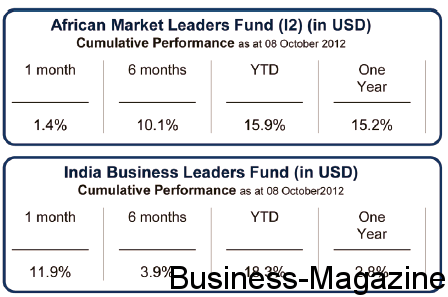The Dark Side of Nigeria
Share

Investors in the continent seem to be excited about Nigeria these days. The country’s oil output is close to 2.5m bbl/day, well above what it used to be just a few years ago, Nigerian banks have undergone a successful recapitalization exercise and profitability is improving fast, the consumer names they say hold much promise in a country where per capita consumption of basics is a fraction of what it is elsewhere. Nigeria they say will rebase its GDP soon at more recent prices which will likely see it become Africa’s largest economy beating South Africa and while the process could be accelerated, Nigeria is moving in the right direction in terms of economic reforms be it in the power sector or the reduction in oil subsidies thereby freeing up Government revenues to better target the poor. With the economy growing at more than 6% in a difficult year for the global economy, the world it seems is jumping on the Nigerian growth wagon with relative ease. Risk premiums have come down too as Nigerian Eurobonds can today fetch 4.5% pa vs the 5.5% they used to fetch months ago but in a country where all seems to be going so well, the dark side is being ignored. As money continues to flow to Africa seeking higher yields and returns, Nigeria, being one of the most liquid markets in Sub Saharan Africa shall continue to make up an important part of these investment flows but before one gets excited by the headlines, it is important to understand the country’s darker side, a side that threatens its eventual breakup.
Remember that war in Libya which was about helping the people of the country getting rid of that now dead dictator? One of the consequences of this war has been the destabilization of a large part of West Africa. Today Niger has become a major black market for increasingly sophisticated weapons on the cheap and not only have many tribal fighters who fought alongside Gadhafi’s forces returned to countries such as Mali but the Niger arms bazar has become the favorite shopping destination for Islamic fundamentalist groups which in many cases may have issues with their local/regional/ national Governments.
Over the past one year, the heavy handed, inefficient and corrupt Nigerian security forces have been installing bayonets on their rifles for as the local joke in the North of the country goes, bullets can sometimes be much less cost effective than the long lasting bayonets. Nigeria is an interesting country. The country with a population of 160m is divided almost in half between two religions, Christianity and Islam. Most Christians live in the south of the country while most Muslims live in the north. In general, while the majority get along with each other just fine, the minority who do not is gaining popularity. When you add the fact that most of the oil resources of the country are in the south to the fact that the distribution of wealth to the Muslim north is dismal, it does not take a genius to figure out that civil unrest is increasingly is a near certainty As Nigeria continues to grow, it is estimated that the increasingly unstable north has been contracting which basically means that only the south is really growing fast with the north holding the national growth figure where it is. Unless Nigeria is able to resolve this increasing wealth gap, the country faces significant risk of collapse in the longer term. The Northern capital of Kano has become a fortress with checkpoints everywhere, human rights violations are rampant and if your husband is a terrorist, even you and your children may be arrested or even shot. The north of the country may not have much in terms of oil wealth but it has historically been an agricultural hotbed but with terror attacks galore these days, transporting fruits and vegetables from the north to the richer south is becoming increasing expensive. Many companies in the food segment continue to see margins under pressure in light of rising prices and inflation while falling is not as low as it could be because of the lack of productivity of the north.
The response of the Nigerian Government so far has been its security forces and blaming northern politicians who may be playing both sides of the game. Regardless, nobody seems to be interested in providing better education, health and economic stimulus to the region. The wealth divide is also leading to increased polarization in the parliament too which is slowing important reforms such as the Petroleum Industry Bill. Northern Nigerians believe the new bill gives too much power to the Niger Delta states and fails to distribute revenue equitably. Jonathan likely wants to solidify the gains for his region in the short term at the expense of the north. Many in Nigeria in fact suspect that southern politicians and not northern ones want and talk openly about a breakup because at the end of the day, they have the oil wealth. Regardless, as long as Nigeria does not pass an investment friendly bill, the production of oil in the country is likely to stall. Stalling is impacting important indigenous companies too. Take the largest indigenous private player, Oando Plc for example, the partial end of oil subsidies in January has already negatively mpacted downstream revenues but the company is also extremely leveraged because it has been making large investments in its upstream operations. The stalling of the bill in parliament for two years now means that Oando is in trouble and now looking for another rights issue despite the fact that its share price which was at NGN 70 when it did the previous rights issue is now at NGN 12.50.
Most traditional benchmarks such as those of MSCI and S&P Sub Saharan Africa ex South Africa indices have close to 70% of the index in liquid Nigeria. Obviously, considering the dark side of Nigeria, your allocation needs to be much less than this but as long as other smaller markets such as Kenya, Ghana, Rwanda, West African BRVM, Mauritius etc do not become liquid enough, the lack of diversification potential with larger fund sizes shall continue to see Africa remain a home for private equity projects and not for listed equity funds.
DISCLAIMER: This article is provided for discussion purposes and does not constitute, nor should it be construed as, an offer, solicitation, advice or recommendation to buy, sell or hold any securities or to employ any investment strategy discussed herein. Readers should seek professional advice regarding the suitability of any securities or investment strategies referred to herein and should understand that any statements, views, opinions, outlooks or forecasts made herein may not be realised.












